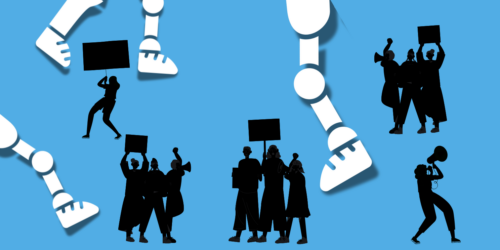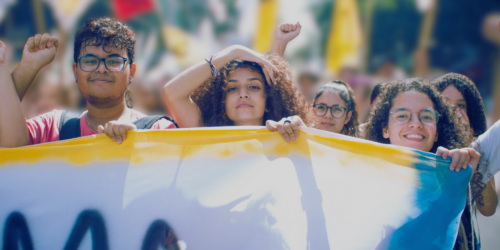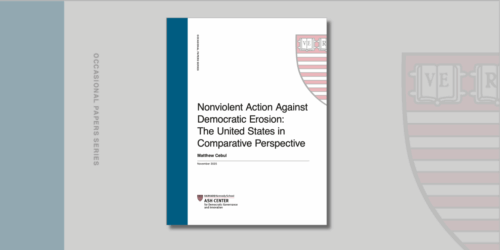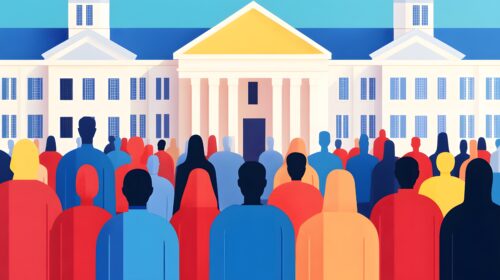Building active channels for the interaction between AI developers and activist communities yields two key benefits.
First, facilitating exposure to the developer community will enable activists to better understand the technology’s nature and its potential to strengthen civil society. By doing so, they can better harness AI’s full capabilities to support democratic movements. Without a general understanding of the technological landscape, activists may find their capacity to leverage AI significantly constrained. In many cases, promising algorithmic prototypes that could significantly benefit civil groups remain underutilized simply because neither developers nor activists are aware of each other’s needs, despite their genuine interest in each other’s work. Even a quick exchange of information could be highly beneficial in bridging this gap, helping both sides unlock new opportunities for collaboration.
Second, the “AI-for-Social-Movement” agenda should also focus on mobilizing more technical minds to support pro-democracy efforts. Activists working on democracy movements often face concrete challenges that require tailored tools to address effectively. Gaining support from like-minded computer scientists and engineers for tool development is crucial and can provide significant assistance. Initiatives like “Computer Scientists Without Borders” or “Coders Without Borders” can act as crucial bridges between activist and developer communities, fostering greater momentum for civil society empowerment.
From the perspective of activists, mobilizing more technological resources to support pro-democracy efforts involves not only the integration of advanced technologies into advocacy work but also actively engaging with the AI developer community. This requires understanding and adapting to the cultures within developer groups, which may not have been previously familiar with political activists. Over the past thirty years, three principles have emerged as widely shared values within the developer community to which activist groups should pay attention.
The first principle is the reliance on collective wisdom, a concept vividly exemplified by the birth of Linux operating system. An open invitation for collective contributions from the developer community could not only unlock the full potential of technologies for advancing democratic causes but also help expand outreach and raise public awareness of the issue. Major technology companies have similarly collaborative practices to tackle democratic and ethical concerns, as illustrated by OpenAI’s 2023 “Democracy Inputs to AI” initiative. Launching initiatives or coding competitions for premium technique solutions on open programming platforms, like Kaggle, would be a resource-efficient way for pro-democracy groups seeking greater technological advantages.
The second principle is the open-source culture, which has long fostered knowledge sharing and collective development within the computer science community. For activists and democracy defenders, these same open-source principles offer powerful advantages: technology that is transparent, adaptable, and collaboratively enhanced – crucial traits when confronting evolving digital threats and oppressive regimes. A prime example is Amnesty International’s Mobile Verification Toolkit, an open-source tool designed to help activists detect spyware threats. By making the source code publicly available, the initiative benefits a broader activist community by enabling easier local deployment and empowering peer developers to build more advanced security solutions based on it.
The third principle arises from the long-lasting anonymous culture in the hacktivist community. Support from anonymous tech-savvy individuals has played important roles in the past democratization movements, like the Arab Spring in Tunisia and Syria. Anonymity not only protects developers from government revenge but also shields the flow of information from digital censorship and surveillance. A good example is the European-based, well-known non-profit hacker group Chaos Computer Club, which has spent the past forty years providing anonymizing services around the world. Nevertheless, this culture of anonymity stands in stark contrast to the emphasis on interpersonal connections and trust in social movements. Embracing cultural differences means activists need to be prepared to interact with nameless developers in the first place and eventually deploy a technique solution from an anonymous submission. This calls for capacity-building within pro-democracy groups so they can effectively share their values, communicate their demands, and strategically engage with the technical community.
In general, a collective initiative designed to connect AI developer groups with the pro-democracy activist community should prioritize effective information exchange and shared values. This effort can begin with simple steps, such as creating a inclusive online platform that facilitates communication between computer scientists and activists. For activists, adopting AI to strengthen civil society also requires understanding the culture of AI developers, recognizing differences, and designing engagement strategies that fully harness the potential of this emerging technology.
********************************************
Jie (Jason) Lian is a postdoctoral researcher at the Nonviolent Action Lab in Harvard Kennedy School as well as an affiliate with the Institute for Quantitative Social Science at Harvard University and the Center for Political Studies at the University of Michigan. His research explores how technology can defend civil liberties and protect vulnerable communities.
The views expressed in this article are those of the author alone and do not necessarily represent the positions of the Ash Center or its affiliates.






